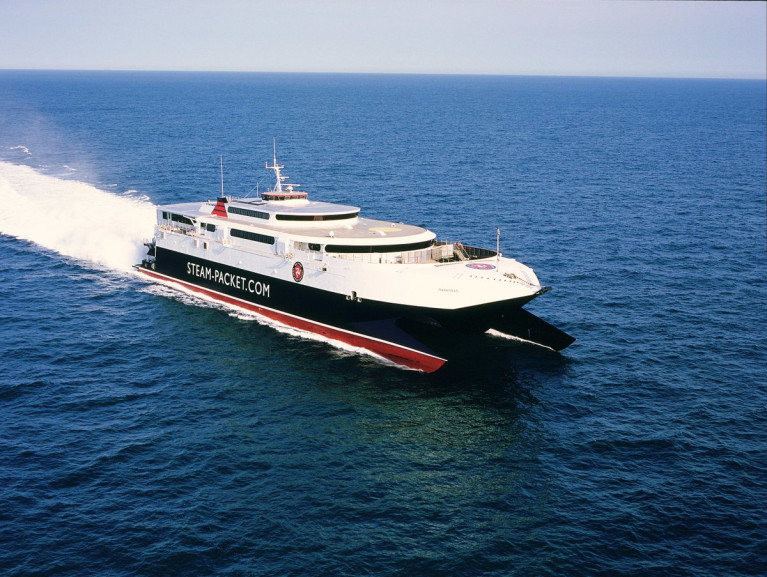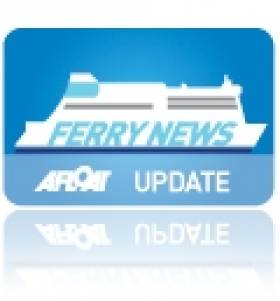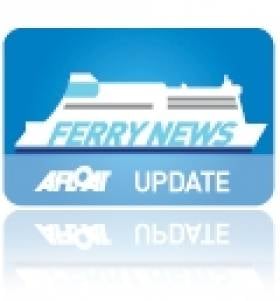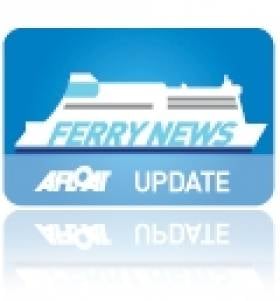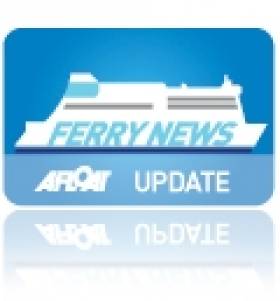Displaying items by tag: Manannan
Manx Cat Calls to Dublin Port following Recent Berthing Trials at Liverpool’s New Ferry Terminal
Observed entering Dublin Bay this morning was the Isle of Man Steam Packet’s Manannan, having departed Douglas Harbour, but the fast-ferry was not in service, writes Jehan Ashmore.
The reason for the call by the 98m catamaran craft to Dublin Port was to enable a safety inspection carried out by the Irish Marine Administration (IMA) at the Department of Transport. The examination is to asses the fitness of the fast-ferry to operate to and from Ireland, prior to resuming the seasonal route between these ports, starting in two week's time on 4 April.
A total of 18 sailings are scheduled for the 2024 timetable, as Afloat previously reported on the crossing taking 2 hours 55 minutes. Facilities of the fastferry include standard seating areas, two cinema lounges, a large bar area at the stern and a cafe, a shop in addition to reserved and premium lounges.
The 1998 built Manannan initially spent some time off the Dublin Bay Buoy before entering the port this afternoon. Likewise of previous such occasions, the fast ferry did not berth at its routine link-span at Dublin Ferryport (Terminal 1) but instead headed upriver to Alexandra Basin (East). It was at the basin's Ocean Pier linkspan where less shipping activity enabled an inspection to be carried out on the fast ferry.
The 865 passenger/200 vehicle capacity fast-ferry will also operate other Irish Sea routes leading up to and during the summer months. This involves the Manx capital’s connection to Belfast and the link to Liverpool; see a related story on the new £70m ferry terminal where a lease agreement has yet to be reached.
In the meantime, Manannan is to remain in Dublin Port until a departure of 18:00.
Manx Fast-Cat Makes Dash to Dublin Port for Examination In Advance of Resuming Services this April
Manannan the fast-ferry catamaran of the Isle of Man Steam Packet, called to Dublin Port for the first time this year, but firstly to undergo an examination of the 96m craft prior to entering service, writes Jehan Ashmore.
The 43-knot fast-ferry built in 1998 by InCAT of Hobart, Tasmania and acquired by the IOMSP in 2009, Afloat had tracked to Dublin Port having on Monday made a morning passage from Douglas Harbour.
The arrival of 865 passenger/200 vehicle Mananan did not involve berthing at Dublin Port's busy main Ferry Terminal No. 1 but upriver to Alexandra Basin and alongside Ocean Pier.
Manannan was boarded by officials of the Irish Maritime Administration (part of the Dept of Transport) to enable an inspection of the craft.
Among the roles of the IMA (equivalent of the UK's Maritime & Coastguard Agency) is to facilitate international safety levels and by enhancing infrastructure needed to secure employment in the shipping, fishing and leisure sectors.
Commenting to Afloat, a spokesperson of the IOM Steam-Packet said the reason for the call by Manannan was to asses the fitness of the fast-ferry to operate to and from Ireland. The examination by the IMA of the Manx-flagged fast-ferry, added the ferry spokesperson had passed with flying colours.
Yesterday, Manannan marked the resumption of the Steam-Packet's core summer route, Douglas-Liverpool by running the 2hr 45 minute crossing. This it to be followed with further connections between the Manx capital and Belfast Harbour (3hrs) on 13 April and calls to Dublin (2hrs 55mins) the next day on 14 April.
Facilities of the fastferry include standard seating areas, two cinema lounges, a large bar area at the stern and a cafe, a shop in addition to reserved and premium lounges.
Previously to this week's call to Dublin Port, Afloat had also tracked Manannan arrive in Douglas Harbour on 26 March having completed a routine annual dry-docking. This year the overhaul took place at A&P Falmouth, Cornwall.
The sailing back from the south-west of England to the Isle of Man involved a passage time taking almost 10 hours.
Manx Fast-Craft Ferry Regains Full Power
#FastCraftRepaired – The Isle of Man Steam Packet's fast-craft, Manannan (1998/5,746grt) has returned to full power following repairs to one of its four engines was finally completed.
According to the operator's website, the Manannan is now operating on all four engines and back to its normal schedule. The Tasmanian built 96m wave-piercing catamaran from the yard of InCat, normally serves her main route between Douglas and Liverpool.
As previously reported in July, she had a suffered a failed crankshaft with one of its four engines.
The incident that took place at the height of the summer season was not at option for the Steam-Packet to take Manannan out of service. Otherwise this would of led to several days to carry out the repairs resulting in huge disruption for passengers.
Instead, the Manx based operator announced a revised schedule allowing for slightly longer journey times, so travellers could plan ahead. This allowed a committment of additional resources to be carried out in repairing the vessel while staying in port overnight.
Ferry Changes on Dublin-Isle of Man Route
#FERRY NEWS- This weekend's round-trip Douglas-Dublin sailings are to be served by fast-ferry Manannan (1998/5,743grt) instead of conventional ferry, writes Jehan Ashmore.
Usually these winter sailings are operated by Ben-My-Chree (1998/12,504grt), as the Dutch built ro-pax is in dry-dock at Cammell Laird, Birkenhead for repairs to her bow-thruster.
The InCAT built Manannan will cover these sailings with an arrival in Dublin Port this evening at 22.00hrs. She spends a short-around in port lasting only 45 minutes, before returning to the Manx capital.
Irish Sea Cross Channel Fast-Ferry Services On Declining Trend
The third service between Belfast-Stranraer is in the hands of rivals Stena Line which maintain the HSS Stena Voyager (1996/19,638 grt) on sailings but only to around mid-November. She will be replaced by conventional sister-ships which will be introduced on the North Channel's newest port when services switch from Stranraer to a new terminal close to Cairnryan.
Finally the fourth fast-ferry is Irish Ferries marketed 'Dublin Swift' service which runs on the Dublin-Holyhead route served by Jonathan Swift (1999/5,989 grt). The craft built by Austal in Fremantle, operates alongside the conventional cruise-ferry Ulysses.
Stena Line's decision to terminate HSS Stena Explorer sailings between Dun Laoghaire-Holyhead this day last week follows fast-ferry Stena Lynx III's end-of-season Rosslare-Fishguard sailings earlier this month.
From next year, Dun Laoghaire-Holyhead sailings are to be seasonal-only and according to Stena Line they hope to resume fast-ferry sailings in April or May though no exact date has been set. Unlike the central corridor route which was entirely dependent on HSS operations, the Rosslare-Fishguard route remains operating year-round with the conventional ferry Stena Europe.
As a result of the discontinued fast-ferries, the HSS Stena Explorer is now spending a lay-up period in the Welsh port for the winter. The smaller Stena Lynx III is also 'wintering' but in on the opposite side of the Irish Sea in Dun Laoghaire, where the vessel has done so in previous years.
The lay-up of both fast-ferries in Dun Laoghaire and Holyhead is ironic considering that neither ports' are connected by the very craft that used to share sailing rosters in recent years. In addition the wintering of these catamaran craft is the first time that this has occurred since the pioneering Stena Sea Lynx fast-ferry launched such sailings in 1993.
This first 'Lynx' provided seasonal sailings on the route with conventional car-ferry Stena Hibernia, the former St. Columba, custom-built in 1977 for Sealink /British Rail. She was given a second name under Stena ownership, the Stena Adventurer and remained on the 57 nautical-mile route until replaced in 1996 by the year-round operated HSS Stena Explorer.
Apart from cross-channel fast-ferry services, the Isle of Man is served by the Isle of Man Steam Packet Co. Ltd's routes linking the islands capital Douglas with Belfast, Dublin, Heysham and Liverpool (Birkenhead) in the winter. These routes include seasonal services which are operated by a combination of conventional tonnage using Ben-My-Chree and fast-ferry Manannan (1998/5,089grt), a former US Navy vessel, to read more click HERE. For sailing schedules, vessel type deployed on route and for fares click HERE.
- Dublin Port
- Irish Ferries
- Dun Laoghaire
- Stena Europe
- Holyhead
- P&O Ferries
- Belfast Harbour
- Stena Line
- Larne
- Ports and Shipping News
- Ulysses
- P&O (Irish Sea)
- Cairnryan
- Ferry news
- Stena Explorer
- Stena Express
- FastFerries
- Cruiseferry
- Manannan
- Isle of Man Steam Packet Co.
- Stena Voyager
- Belast Port
- Isle of Man ferry services
- P&O Express
- Irish Sea fastferries
- Stena 'Lynx'
- BenMyChree
- Dublin Swift
- Stena Sea Lynx
Former US Navy Fast-Craft Re-opens Seasonal Dublin Route
Manannan's chequered career included a five year charter initially to the United States Navy but transferred to the United States Army Forces between 2001-2006. The 5,029grt craft (see photo) was used for various trials and demonstrations and in which saw service in the Persian Gulf in support of 'Operation Iraqi Freedom' and in 2003 'Operation Enduring Freedom' in the Horn of Africa.
An engine plant of 4 x Caterpillars diesel generates a speed of over 40 knots / 46 mph which provided logistical solutions by the High-Speed Vessel (HSV) to transport troops and supplies covering long distances in support of the Combined Joint Task Force.
Other tasks required by the force included the roles of operating as a mobile command centre which entailed working closely inshore and operating as a helicopter carrier. Helicopters landed at the craft's stern positioned helicopter landing deck.
The military role of the craft is in stark contrast compared to when the 96m ferry was launched in 1998 for civilian purposes as the Incat 050, the number representing the number of pioneering wave-piercing craft built by InCat in Hobart, Tasmania.
Asides her military days the 800-passenger / 200 vehicle fast-ferry has served the Hobart-Melbourne route, between New Zealand's north and south island and in European waters in the Mediterrean and to the Canary Islands.
Manannan (see photo) entered service last May after the Isle of Man Steam Packet Company (IOMSPco) purchased the vessel which was laid-up in Hobart. She made the long delivery to the northern hemisphere and was re-converted for ferry usesage during a refit in Portsmouth.
The 181 year-old company is the only sea-based passenger operator to the island on services linking Dublin, Belfast, Heysham, Liverpool and (Birkenhead) in the winter months.
There are rival companies such as the Ramsey Steamship Company but they are freight-only operators mostly running to Belfast and Liverpool using short-sea coastal traders and to other small Irish Sea ports.
An annual round island cruise is held and like last year the Manannan will be serving the cruise on Sunday 1 May departing Douglas at 11am for a journey of around 2 hours. The route closely circumnavigates the spectacular Manx coastline. For information on the island cruise and fares click here.



























